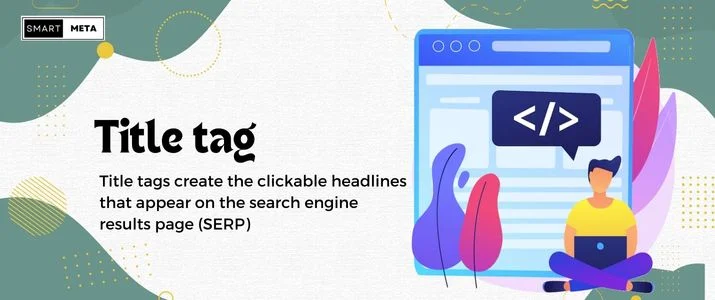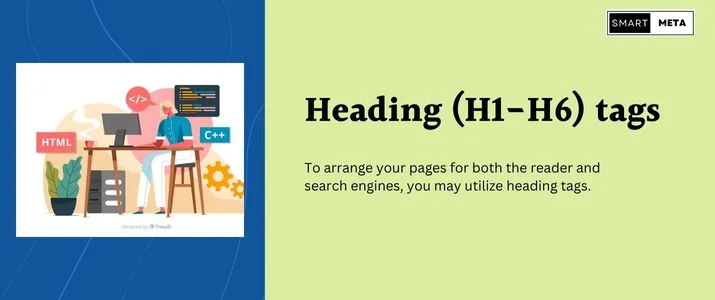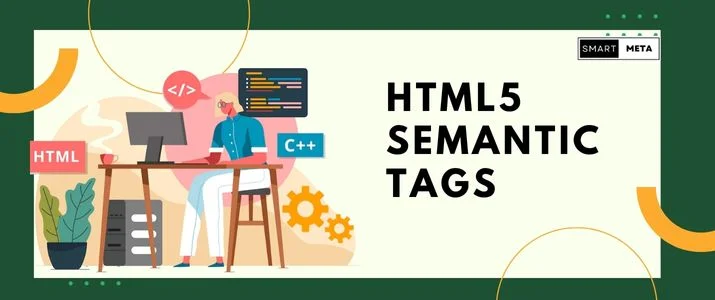Table of Contents
In addition, to HTML tags, which are code components associated with the back-end of all web pages, there are specialized HTML tags & kinds that supply search engines with critical information for SERP presentation. Essentially, these components draw attention to certain portions of your content that are important for search, and they provide descriptions of those pieces to search crawlers.
You are not required to utilize all of these additional coding tools. Search engines are becoming more intelligent, and HTML tags are being used much less often than in the past. However, a few tags have managed to hang on – and in some cases, their SEO worth has even increased.
This piece will go over some of the most important search engine optimization HTML tags that are still relevant.
Title tag

Title tags create the clickable headlines that appear on the search engine results page (SERP). The creation of a SERP headline for your page is, in most cases, left to Google’s discretion. It may choose to utilize any of the section headers from inside the page, or it may generate a whole new headline from scratch.
However, the HTML tags header is the first place Google will look for headline ideas, and if a title tag is present, Google will almost certainly use it as the primary headline in the relevant result. Therefore, improving the title tag provides you with some influence over how your website is shown on the search engine results page (SERP).
Meta description tag

Meta description tags create descriptions that appear inside search result snippets. Unfortunately, Google does not always employ meta description tags to generate these snippets. Still, if the meta tag is present, there is a strong probability that your meta description will appear on the search engine results page (“SERP”).
However, keep in mind that Google may choose to skip the meta description element and instead use a portion of the page’s content instead. In most cases, this occurs when the quotation is a better fit for a certain query than the meta description would have been.
Essentially, Google will choose the most appropriate alternative for improving your chances of being clicked on with the help of the Html tags header.
Heading (H1-H6) tags

To arrange your pages for both the reader and search engines, you may utilize heading tags.
We no longer read articles from beginning to end; instead, we scan them until we discover the portion that interests us, read that bit, and then go on to the next item in the same category.
And if the content isn’t broken down into pieces, many people will abandon it straight away because it’s simply too much information. So, as a result, headers are very useful as reading aids from the user’s standpoint.
From the viewpoint of the search engine, header tags, on the other hand, are the most important parts of the content since they assist search crawler bots in comprehending what the page is about.
Alternative text for images

While the primary purpose of alt text is to improve online accessibility, the primary goal of the alt property is to improve picture indexing in search results.
The primary objective of picture alt text is to assist people in understanding the image when they are unable to see it, such as when a visitor has a visual impairment. In this case, as well as in situations when, for example, there is a problem and the picture will not load, the alt text may explain what is included inside the image rather than seeing it.
From search engine optimization, alt text plays a significant role in how photos are indexed in Google search. In other words, if your business relies on visual elements – whether they be photos of your items, your labor, stock images, or art – you should strongly consider including image alt texts in your website’s code.
The use of schema markup

Schema markup is used to enrich normal SERP snippets with rich snippet characteristics. In addition, Schema.org maintains a set of HTML tags with examples created in collaboration with Google, Bing, Yahoo!, and Yandex.
Webmasters may use the various Html tag types to provide search engines with more information about different sorts of sites by submitting them to Schema.org. In turn, search engines utilize this information to enrich their search engine results pages (SERPs) with various useful features.
There is no assurance as to whether or not utilizing Schema markup increases one’s chances of ranking in search results; nonetheless, there is little doubt that the generated snippets are far more visually appealing than ordinary snippets, and as a consequence, one’s position in search is improved.
HTML5 semantic tags

HTML5 elements are used to provide more detailed explanations of different page components. Before introducing HTML5 features, we mostly utilized div tags to divide & HTML tags & into discrete components. Then we used classes and IDs to identify the components inside the HTML tags code structure.
With the advent of semantic HTML5 elements, we now have a collection of user-friendly tags that describe a different page component. In other words, instead of labeling our content with a complicated slew of divs, we now have a method of expressing the ingredients in a straightforward, standardized manner.
Tags for meta robots

The robot’s meta tag is concerned with the rules of interaction that apply between websites and search engine crawlers. If there is no meta robots tag, the crawlers will do whatever they want without restrictions.
Canonical Tag

The canonical tag protects you against the possibility of having duplicate content on your website. To summarise, anyone’s page may have several different addresses associated with it via no fault of your own.
It isn’t a huge deal, except that all of those addresses may be costly on your crawl budget and page authority, and it may also cause problems with your performance monitoring system. Alternatively, you may use a canonical tag to notify a search engine which of those page URLs is the primary one to be shown on its results page for the HTML tags tutorial.




